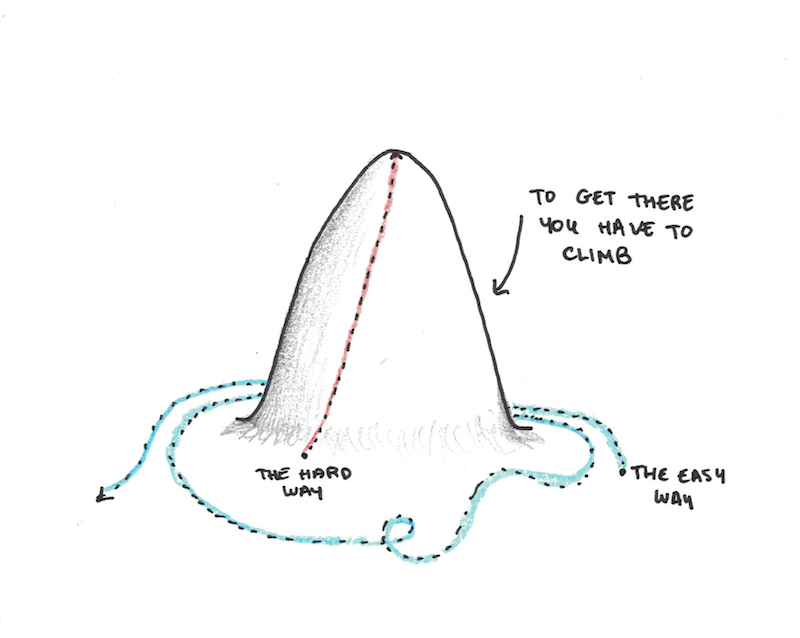T he hardest things end up becoming the easiest, once you’ve fully committed to them. Most pursuits have some unavoidable effort. You can either choose to commit that effort or find ways to pretend it doesn’t exist.

A few years back, when I decided, I wanted to start something of my own- there were a lot of spillover benefits to other areas of my life, even though they weren’t related to entrepreneurship. I started reading books, listening to podcasts, exercising regularly and eating healthier, for instance. The default nature of your goal pushes you to put in all the efforts that you always procrastinated.
The difficulty of the new challenge forces you to take things seriously. In my case, starting a company was a difficult enough goal to sustain that forced me to build habits that I always found difficult otherwise.

You have the ability to put far more effort into things than you normally do. The reason you don’t is that most of the time, a full effort isn’t necessary.
We think that a full effort will be draining, that we ought to save our energy for when we really need it. Yet, more often than not, the opposite is the case. When we really use our full effort toward a central concern that matters deeply to us, we feel more energized — not less.
I had a beautiful takeaway after listening and reading Scott H Young (Ultralearning is a must-read)
When you’re working on a pursuit that may fail if you don’t take it seriously, you find the energy to take it seriously. And, in doing so, you find the other nagging things in life that needed effort weren’t so hard either.

And now, when I apply this same story to the
challenge we’ve taken to solve through Spalba- We often get
asked
that we are trying to be very ambitious and trying to do a
lot.
Is it the
right approach?
At Spalba, we’re trying to reinvent event planning and event management.
And when we say Re-Invent we
mean it
literally.
We are actually trying to organise, streamline and
aggregate
an entire industry (or rather a $1.1 Trillion industry).
Event Tech so far has been used very loosely as a term that defines using technology to power event planning or maybe using a planning tool/app for online registrations and attendee management. However, today when every industry is tasting the needed revolution through the disruption of tech- EdTech, FinTech, FoodTech, HealthTech etc. etc. The event and experiences industry stands to be one of the least evolved or transformed industry by tech as per a Mckinsey report.
We define Spalba as an Event Tech platform where we are actually using the power of first-gen technologies like A.I+X.R+M.L+Data Sciences to make the process of event planning an event simple from inception to execution.

When enough companies have been running in the ecosystem- surviving, thriving and unicorn flying by just doing one thing out of the entire pie chart.
“You are trying to do too much”- The favourite feedback we generally get from most of the investors, VCs in our first go.
But, that’s the thing and our forever favourite answer- what we are trying to do is the 70-80% of the pain that this industry bears due to lack of avenues, companies or solutions trying to solve this thread and yes, it’s hard. But if we could do this part the remaining 30% will follow(which currently comprises of few billion dollars market of event tech already)
At Spalba, using intelligence and the power of
data, we are trying to build an A.I driven marketplace for Event Venues
and
Vendors where both sellers and buyers have highly advanced tools to
optimize
their resources, enhance their visibility, generate business
opportunity and
maximize their revenues.
And then things like A.I driven workflow
automation, insights and analytics etc are the peripheral things
that can be
easily plugged into the system.
Yes, this is one call of the “Hard Thing” to streamline and organize the most unstructured market in the most promising format and while we are at it we want to go for the 70% of the hard things so, that 30% of other things would fall easy.
Coming from the industry, being a part of this mayhem for decades- the core team at Spalba actually feels for the pain that has to be solved.
Almost $280 billion is spent each year on
corporate events in the U.S., and brands are spending more and more
on
experiential marketing. With this comes a growing industry of
supporting
services — fabrication shops building pop-up structures, new types
of
entertainment for hire, and of course traditional categories like
florists
and caterers . The event planning industry is expected to grow
faster than
average over the next ten years. But currently, there isn’t a
technology
platform that facilitates this market of people planning corporate
events
and with the venues and professionals on whom they depend to make
their
event a success. As a result, both sides rely on frustrating Google
searches
(or website SEO) and word-of-mouth to do business.
A problem
worth
solving for, a problem with the potential to build a new google for
the
event and experiences industry.

The hard way forces a choice: are you willing to invest the effort required to do it right?
As with any real choice, sometimes the answer is no. The cost is too high, other obligations take precedence or you simply don’t care enough. No is always a valid answer. Better to say it now, than let it rot away your resolve over time.